-
New Yorker sentenced to 16 years for trying to buy ricin
It was a scary scenario: Chinese national Cheng Le, living in New York City, attempted to order ricin through the so-called dark Web. Ricin is a highly potent and potentially fatal toxin with no known antidote. What did Le plan to do with the ricin? Nothing good. According to U.S. Attorney for the Southern District of New York Preet Bharara, “In Le’s own words, established at trial, he was looking for ‘simple and easy death pills’ and ways to commit ‘100 percent risk-free’ murder.”
-
-
Global warming could help crops’ productivity
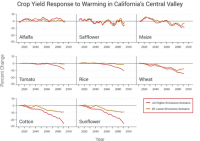
Many scientists fear that global warming will hit staple food crops hard, with heat stress, extreme weather events, and water shortages. On the other hand, higher levels of carbon dioxide — the main cause of ongoing warming — is known to boost many plants’ productivity, and reduce their use of water. So, if we keep pouring more CO2 into the air, will crops fail, or benefit? A new study tries to disentangle this complex question. It suggests that while greater warmth will reduce yields of some crops, higher CO2 could help mitigate the effects in some regions, unless other complications of global warming interfere.
-
-
Congress’ inaction hobbles U.S. preparation for a major Zika virus outbreak: Experts

Despite dire predictions that the Zika virus could affect much of the United States including large cities this summer, the country is unprepared, and the financial and moral consequences could be significant. Earlier this year, President Barack Obama requested $1.86 billion for surveillance, mosquito control, research and health services, but Congress has not approved the funding. In the absence of Congressional action, the president reallocated $589 million of designated Ebola funds to Zika preparedness, research and the creation of response teams. “The nation’s state of preparedness is compromised by Congress’s inaction on supplemental funding and the weak capacities and powers of states and localities,” two public health experts say.
-
-
Haiti’s cholera epidemic could have been prevented with low-cost approaches
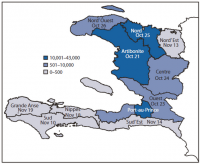
Haiti’s cholera epidemic killed close to 9,000 people and hospitalized hundreds of thousands more. The epidemic also spread to several neighboring countries. Cholera remains a critical risk for UN peacekeeping operations, years after Nepalese troops inadvertently introduced the disease to Haiti in fall of 2010 and triggered one of the worst epidemics in recent years. Researchers have found that simple and inexpensive interventions — which the United Nations has yet to implement — would be effective in preventing future outbreaks of the bacterial infection.
-
-
New way to clean contaminated groundwater

A team of researchers has helped discover a new chemical method to immobilize uranium in contaminated groundwater, which could lead to more precise and successful water remediation efforts at former nuclear sites. Uranium is present in contaminated groundwater at various sites in the United States as a legacy of Cold War-era processing and waste disposal activities associated with nuclear materials production.
-
-
Zika virus “scarier than we initially thought”: U.S. health officials
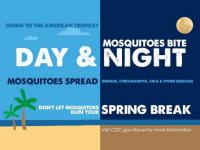
Dr. Anne Schuchat from the Centre for Disease Control and Prevention (CDC) said the Zika virus is more of a threat than previously thought. Speaking at a White House press conference, she said there was potential for the virus to spread to more U.S. states than experts first believed. “Most of what we’ve learned is not reassuring. Everything we look at with this virus seems to be a bit scarier than we initially thought,” she told reporters.
-
-
Novel alignment-free sequence descriptors in Zika virus characterization
The recent epidemic of Zika virus infections in South and Latin America has raised serious concerns on its ramifications for the population in the Americas and spread of the virus worldwide. Researchers explain their research on computer-assisted approaches toward surveillance and consequent design of drugs and vaccines to combat the growth and spread of the Zika virus.
-
-
Limited awareness or concern about Zika virus in U.S.
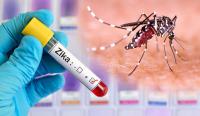
A recent survey by the Associated Press-NORC Center for Public Affairs Research finds that three-quarters of Americans who have heard at least a little about the Zika virus are aware that the virus is linked to birth defects in babies born to infected mothers. However, the survey found that most Americans are unclear about the availability of tests to diagnose Zika and whether or not preventative vaccines and effective medicines exist to treat it.
-
-
Soil’s carbon storage could help limit impact of climate change
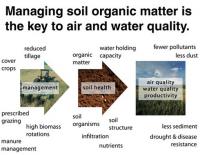
Soils currently lock away around 2.4 trillion tons of greenhouse gases, which are stored underground as stable organic matter. Researchers say the world’s soils could store an extra eight billion tons of greenhouse gases, helping to limit the impacts of climate change. Growing crops with deeper root systems, using charcoal-based composts, and applying sustainable agriculture practices could help soils retain the equivalent of around four-fifths of annual emissions released by the burning of fossils fuels, the researchers say.
-
-
Oil, gas wastewater disposal pollutes surface water, harm waterways

Unconventional oil and gas (UOG) operations combine directional drilling and hydraulic fracturing, or “fracking,” to release natural gas and oil from underground rock. This process results in in water pollution which may increase endocrine disrupting chemicals (EDCs) in surface and ground water, exposing populations living near these operations to increased risk of disease. High levels of EDC activity were found in the surface water near a hydraulic fracturing wastewater disposal facility in West Virginia. Approximately 36,000 of these disposal wells are currently in operation across the United States.
-
-
Paper-based test to help prevent food poisoning
The foodborne bacteria Salmonella alone led to nearly 20,000 hospitalizations and almost 400 deaths in 2013. Economists estimate that the treatment of all these patients and the related productivity losses cost more than $3 billion annually. And those numbers account for just one of the fifteen pathogens responsible for most of the food poisoning cases. Scientists have developed a simple, paper-based test that could help detect pathogens hitchhiking on food before they reach store shelves, restaurants and, most importantly, our stomachs.
-
-
2010 Maryland food poisoning outbreak traced to Asian strain of seafood pathogen
V. parahaemolyticusis the most important cause of seafood poisoning in the United States. Approximately 4,500 cases occur annually in the United States, according to the Center for Disease Control and Prevention. The number of cases has risen in recent years, possibly do to the warming climate.
-
-
Starvation is only one crop breeding cycle away
Global population growth, urbanization, and a changing climate mean staple food crops will need to achieve much higher yields in the near future. New research proposes genetic engineering solutions to improve photosynthetic efficiency of food crops, boosting yield under higher temperatures and carbon dioxide levels. Because it can take twenty to thirty years of breeding and product development efforts before new crops are available to farmers, those efforts must start now.
-
-
Efficient alternative for Ebola screening program for travelers
As of 31 January 2016, a total of 28,639 cases and 11,316 deaths have been attributed to Ebola, figures that are assumed to significantly underestimate the actual scope of the 2014 Ebola Hemorrhagic Fever outbreak in West Africa. In the United States, there were also two imported cases and two locally acquired cases reported in September-October 2014. Researchers offer an alternative policy for Ebola entry screening at airports in the United States. “Security measures implemented after 9/11 taught us a lot about what not to do,” one of the researchers say. “We learned that finding the one person who intends to do harm out of several million passengers is akin to finding a needle in a haystack.”
-
-
Ebola no longer a “Public Health Emergency of International Concern”: WHO
On Tuesday the WHO officials met to consider the Ebola virus disease (EVD) outbreak in West Africa, and to decide whether the event continues to constitute a Public Health Emergency of International Concern (PHEIC) and whether the current Temporary Recommendations should be extended, rescinded, or revised. WHOconcluded that Ebola transmission in West Africa no longer constitutes an extraordinary event, that the risk of international spread is now low, and that countries currently have the capacity to respond rapidly to new virus emergences. Accordingly, the Ebola situation in West Africa no longer constitutes a Public Health Emergency of International Concern, and the temporary recommendations adopted in response should now be terminated.
-
More headlines
The long view
What We’ve Learned from Survivors of the Atomic Bombs
Q&A with Dr. Preetha Rajaraman, New Vice Chair for the Radiation Effects Research Foundation in Hiroshima and Nagasaki, Japan.
Combatting the Measles Threat Means Examining the Reasons for Declining Vaccination Rates
Measles was supposedly eradicated in Canada more than a quarter century ago. But today, measles is surging. The cause of this resurgence is declining vaccination rates.
Social Networks Are Not Effective at Mobilizing Vaccination Uptake
The persuasive power of social networks is immense, but not limitless. Vaccine preferences, based on the COVID experience in the United States, proved quite insensitive to persuasion, even through friendship networks.
Vaccine Integrity Project Says New FDA Rules on COVID-19 Vaccines Show Lack of Consensus, Clarity
Sidestepping both the FDA’s own Vaccines and Related Biological Products Advisory Committee and the CDC’s Advisory Committee on Immunization Practices (ACIP), two Trump-appointed FDA leaders penned an opinion piece in the New England Journal of Medicine to announce new, more restrictive, COVID-19 vaccine recommendations. Critics say that not seeking broad input into the new policy, which would help FDA to understand its implications, feasibility, and the potential for unintended consequences, amounts to policy by proclamation.
Are We Ready for a ‘DeepSeek for Bioweapons’?
Anthropic’s Claude 4 is a warning sign: AI that can help build bioweapons is coming, and could be widely available soon. Steven Adler writes that we need to be prepared for the consequences: “like a freely downloadable ‘DeepSeek for bioweapons,’ available across the internet, loadable to the computer of any amateur scientist who wishes to cause mass harm. With Anthropic’s Claude Opus 4 having finally triggered this level of safety risk, the clock is now ticking.”
“Tulsi Gabbard as US Intelligence Chief Would Undermine Efforts Against the Spread of Chemical and Biological Weapons”: Expert
The Senate, along party lines, last week confirmed Tulsi Gabbard as Director of National intelligence. One expert on biological and chemical weapons says that Gabbard’s “longstanding history of parroting Russian propaganda talking points, unfounded claims about Syria’s use of chemical weapons, and conspiracy theories all in efforts to undermine the quality of the community she now leads” make her confirmation a “national security malpractice.”
